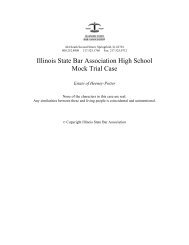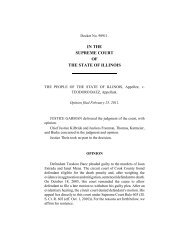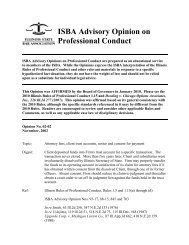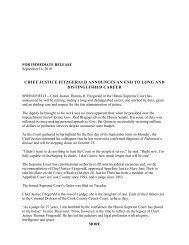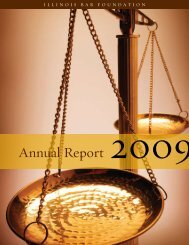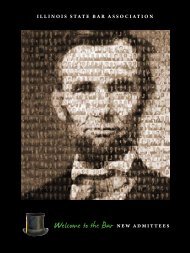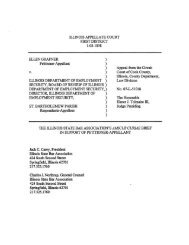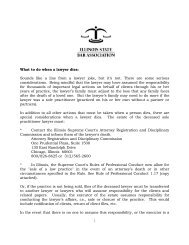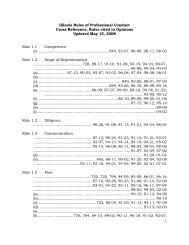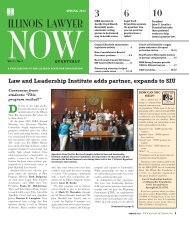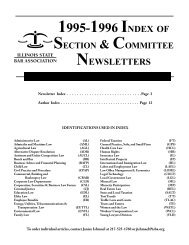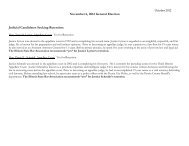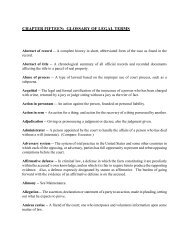MOTIONS TO DISMISS PURSUANT TO 735 ILCS 5/2-615 AND 2-619
MOTIONS TO DISMISS PURSUANT TO 735 ILCS 5/2-615 AND 2-619
MOTIONS TO DISMISS PURSUANT TO 735 ILCS 5/2-615 AND 2-619
Create successful ePaper yourself
Turn your PDF publications into a flip-book with our unique Google optimized e-Paper software.
(8) Unenforceable Claim Due To Minority Or Other Disability<br />
5/2-<strong>619</strong>(a)(8) provides that a claim may be dismissed because “… the claim asserted<br />
against defendant is unenforceable because of his or her minority or other disability.”<br />
This provision is applicable to circumstances where a contract claim is barred based on the<br />
defendant’s lack of capacity to contract due to his or her age or mental incompetence. It has<br />
seldom been used since the 1955 amendments which revised the second ground for dismissal (i.e.<br />
Section 2-<strong>619</strong>(a)(2) to include lack of capacity of the defendant as well as the plaintiff.<br />
(9) Barred By Other Affirmative Matter Defeating The Claim<br />
5/2-<strong>619</strong>(a)(1) provides that a claim may be dismissed because “…the claim asserted against<br />
defendant is barred by other affirmative matter avoiding the legal effect of or defeating the claim.”<br />
The term “affirmative matter” is broader than “affirmative defense.” Hermes v. William F.<br />
Meyer Co., 65 Ill. App. 3d 745, 382 N.E.2d 841 (2d Dist. 1978). It encompasses any defense other<br />
than a negation of the essential allegations of the plaintiff’s cause of action. Kedzie and 103rd<br />
Currency Exchange, Inc. v. Hodge, 156 Ill. 2d 112, 115, <strong>619</strong> N.E.2d 732, <strong>735</strong> (1993). Accord In<br />
Re Marriage of Vaughn, 403 Ill. App. 3d 830, 935 N.E.2d 123 (1st Dist. 2010).<br />
“Affirmative matter” has been held to include a type of defense that either defeats an<br />
alleged cause of action completely or refutes crucial conclusions of law or conclusions of material<br />
fact contained in or inferred from the complaint. Zahl v. Krupa, 365 Ill. App. 3d 653, 659, 850<br />
N.E.2d 304, 310 (2d Dist. 2006); Consumer Electronics Co. v. Cobelcomex, Inc., 149 Ill. App. 3d<br />
699, 703, 501 N.E.2d 156, 159 (1 st Dist. 1986). Accord Pryweller v. Cohen, 282 Ill. App. 3d 899,<br />
907, 668 N.E.2d 1144, 1149 (1 st Dist. 1996).<br />
SECTION 2-1005 <strong>MOTIONS</strong> FOR SUMMARY JUDGMENT<br />
1. The Statute<br />
5/2-1005 provides:<br />
Sec. 2-1005. Summary judgments. (a) For plaintiff. Any time after the opposite party has<br />
appeared or after the time within which he or she is required to appear has expired, a plaintiff may<br />
move with or without supporting affidavits for a summary judgment in his or her favor for all or<br />
any part of the relief sought.<br />
(b) For defendant. A defendant may, at any time, move with or without supporting affidavits for a<br />
summary judgment in his or her favor as to all or any part of the relief sought against him or her.<br />
(c) Procedure. The opposite party may prior to or at the time of the hearing on the motion file<br />
counteraffidavits. The judgment sought shall be rendered without delay if the pleadings,<br />
depositions, and admissions on file, together with the affidavits, if any, show that there is no<br />
genuine issue as to any material fact and that the moving party is entitled to a judgment as a matter<br />
of law. A summary judgment, interlocutory in character, may be rendered on the issue of liability<br />
alone although there is a genuine issue as to the amount of damages.<br />
(d) Summary determination of major issues. If the court determines that there is no genuine issue<br />
14



